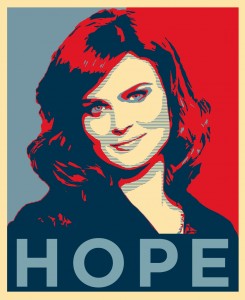I may be in Bulgaria, but I still manage to keep up with my favorite TV shows. Recently on Bones, Dr. Temperance Brennan articulated some ideas that have been bouncing around my own skull recently.

Photo credit: Bones Writer/Producer Dean Lopata
Brennan: “I believe every American should consider what is his or her greatest contribution to the common good.”
Booth: “And yours would be running for president?”
Brennan: “I’m brilliant– that is not in dispute.”
As an intelligent and ambitious Scripps woman, I’m wondering, what would be my greatest contribution to society? Isn’t it my civic duty to put this brain of mine to its best use? The most terrifying aspect of career planning, for me, is the idea that I may not live up to my own potential.
I gave up my dreams of the presidency around middle school when I realized that I, like Dr. Temperance Brennan, had little to no chance of being elected to the highest office in America as an atheist. But, there are still plenty of other ways that I could work to improve the lives of others.

Gif from Tumblr- ilovemystripysocks
How can I tell what work is “highly valuable” and respected by society?
Society seems to have a couple of bars by which we judge value. Forbes’ article “The 15 Most Valuable College Majors,” unsurprisingly uses salary and expected earnings to rank majors. I disregarded money-based value judgments long before I chose a self-designed creative writing major (about as far as can be from Petroleum Engineering and Management Information Systems).
On the other hand, we conflate selectivity and value. This is clear in the undergraduate admissions process with Ivy League obsession. It’s also a judgment that presents itself in grad school admissions. The MCAT and LSAT are notoriously difficult, and so we conclude that only the best and smartest among us become doctors and lawyers. Something I didn’t expect to discover in my graduate school research: the most selective med school, the Mayo Medical School, has an acceptance rate of 2.2% ; the most selective MFA in creative writing (Vanderbilt University) has an acceptance rate of 1%.
As I try to map out a career path, or at least a 5-year-plan or two, it’s difficult to ignore the engrained idea that smart, engaged citizens follow these two paths— mountains of money and/or prestigious altruism. As an amateur career-cartographer, it’s hard not to let these voices affect how I plot my own course. I’m lucky to have the Scripps community and CP&R cheering me on, because all of this is a lot easier knowing there are people who have my back.
So what should I do?
In four years at Scripps, I learned that success comes easier when we’re doing something we love. As for value, maybe I should make my judgment based on what’s been of the most value to me—educational support. I’ve found a couple ways I might pay this forward. There are a number of Americorps positions at non-profits working to expand college access for low-income and potential first-generation college students through near-peer mentoring and academic coaching. I may not get the starting pay of a software engineer, but it’s worth it do something I love.
As I embark on a career in higher education administration, I may never find the cure for cancer or put an end to war through international diplomacy, but I hope to help other achieve those dreams. And maybe one day yet I’ll have the title “President” in front of my name.
——
FMI on Americorps college access programs: Schuler Scholars Program, College Possible (with a new site in Portland!), College Forward, Kentucky College Coaches, or the Americorps website for more opportunities to serve.
